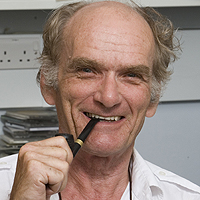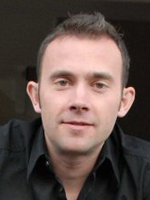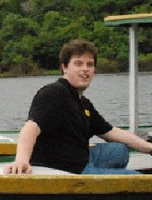Thursday 29th March – Dr Michael Brooks – “The Quantum Astrologers Handbook”
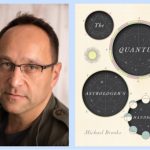
Michael Brooks resurrects the extraordinary story of Jerome Cardano. This 16th century Renaissance Italian was a gambler who invented the theory of probability, an astrologer to popes and emperors who taught the public how to map the heavens, a doctor consulted by kings, archbishops and senators, a mathematician who discovered the secrets of imaginary numbers – and a victim of the Inquisition whose punishment was to disappear from history.
In this talk, Brooks will tell the forgotten story of Cardano’s life, and trace the astrologer’s legacy all the way to the frontiers of modern physics, uncovering some extraordinary insights along the way.
Michael Brooks, who holds a PhD in quantum physics, is an author, journalist and broadcaster. He is a consultant at New Scientist, a magazine with over three quarters of a million readers worldwide,and writes a weekly column for the New Statesman. He is the author of At The Edge of Uncertainty, The Secret Anarchy of Science and the bestselling non-fiction title 13 Things That Don’t Make Sense. His writing has also appeared in the Guardian, the Independent, the Observer, the Times Higher Education, the Philadelphia Inquirer and many other newspapers and magazines. He has lectured at various places, including New York University, The American Museum of Natural History and Cambridge University.
Thursday 22nd February – Dr Richard M Crowther “Robots + AI = Disruption”
 Hardly a day goes by without the publication of a story in the press informing us that by 2030 over 30% of UK jobs could be replaced by robotic systems. Historically the introduction of technology has enhanced the experience of the workforce. The introduction of advanced robotics however is associated with the workforce polarization into either high-skilled, highly-paid or low-skilled, poorly-paid employment with the loss of mid-skilled jobs. The presentation will go behind the hype and look at the current state of robotic systems, and how its integration with artificial intelligence has led to this situation.
Hardly a day goes by without the publication of a story in the press informing us that by 2030 over 30% of UK jobs could be replaced by robotic systems. Historically the introduction of technology has enhanced the experience of the workforce. The introduction of advanced robotics however is associated with the workforce polarization into either high-skilled, highly-paid or low-skilled, poorly-paid employment with the loss of mid-skilled jobs. The presentation will go behind the hype and look at the current state of robotic systems, and how its integration with artificial intelligence has led to this situation.
In the presentation Dr Crowder will discuss the social, ethical and technical challenges of current work in robotics, illustrated by systems that he has developed.
Richard’s Bio
Richard Crowder was born in Macclesfield Cheshire and received his BSc and PhD in Engineering from the University of Leicester. He joined the academic staff of the University of Southampton in 1982, and following retirement in 2017, he is currently a visiting fellow. During his time at Southampton he was in the Department of Electronics and Computer Science, undertaking research into robotics and the sociotechnical aspects of engineering design. He is the author of over 140 academic papers and two books in these field.
Thursday 25th January – Andrew Copson: Secularism:politics, religion, and freedom
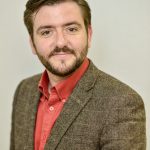
Secularism is an increasingly hot topic in public, political, and religious debate across the globe. It is embodied in the conflict between secular republics – from the US to India – and the challenges they face from resurgent religious identity politics; in the challenges faced by religious states like those of the Arab world from insurgent secularists; and in states like China where calls for freedom of belief are challenging a state-imposed non-religious worldview.
In his new book, Andrew tells the story of secularism, taking in momentous episodes in world history, such as the great transition of Europe from religious orthodoxy to pluralism, the global struggle for human rights and democracy, and the origins of modernity.
Andrew’s bio
Andrew is Chief Executive of Humanists UK (formerly the British Humanist Association). He became Chief Executive in 2010 after five years coordinating Humanists UK’s education and public affairs work. Andrew is also President of the International Humanist and Ethical Union (IHEU).
Together with A C Grayling, Andrew edited the Wiley Blackwell Handbook of Humanism (2015). His new book, Secularism: Politics, Religion, and Freedom, was published in September 2017 by Oxford University Press. His writing on humanist and secularist issues has appeared in The Guardian, The Independent, The Times, and New Statesman as well as in various journals.
Andrew has represented Humanists UK and the humanist movement extensively in national news including on BBC, ITV, Channel 4, and Sky, as well as on programmes such as Newsnight, The Daily Politics, the Today programme, Sunday Morning Live, and The Big Questions.
Andrew’s website can be found here.
Thursday, 14th December – Dead Talks – celebrating ludicrous ideas of the past

An evening celebrating the laughable and ludicrous ideas of the past.
Join us as we explore the notions that have fallen by the wayside of science, history and fringe thought. Because one day, your ideas may be there too.
Expanding Earth
Theory Logicism
The Planet Vulcan
The Four Humours
Is More Better?
And more …
Speakers from Southampton Bright Club and Winchester Skeptics, led by comedian and producer Rachel Wheeley.
https://
from Science Showoff Talent Factory
Thursday, 30 November – Jonathan M.S. Pearce – Do we have free will?
 This talk is a fine introduction into the age-old philosophical debate as to whether we have free will, or whether we live determined lives.
This talk is a fine introduction into the age-old philosophical debate as to whether we have free will, or whether we live determined lives.
Pearce approaches the subject in a lively manner, explaining terms clearly and using anecdotes to break down some of the heavier philosophy so that it is available to the popular audience. Now that we are understanding our genetic heritage and our neurology better, can we account for all our characteristics and decisions? The author also looks at how theories of free will and determinism integrate with religion, particularly Christianity. If we live under the illusion of free will, do religions need reassessing? How does free will work when God knows what we are doing in advance? Does God have free will? How does prophecy interfere with free will? How is our justice system affected if we know exactly why people commit crimes?
These and other crucial questions are investigated with a deft touch and uses recent and important scientific findings to support the thesis supplying a valuable overview to the subject.
Jonathan M.S. Pearce is a teacher from south Hampshire, UK, who has dedicated many years to studying all manner of things philosophical and theological. Having studied for a Masters in Philosophy from the University of Wales, TSD, he also holds a degree from the University of Leeds, and a PGCE from the University of St Mary’s, Twickenham. As a founder member of the Tippling Philosophers, a friendly group of disparate believers and non-believers (and sort-of believers) based in Hampshire, he is a big advocate of casual philosophy groups meeting over pints of good ale. He lives with his partner (and twin boys) and wonders how she puts up with him.
Thursday 26th October Dr Mike Wood -Sense, nonsense, and everything in between: The psychology of conspiracy theories
 Conspiracy theories are everywhere – and, arguably, always have been. What influences us to believe or reject them? Why do some events give rise to more conspiracy theories than others? What does the prevalence of conspiracy theories say about us as a society? And how is The Simpsons like an ancient Babylonian sheep’s liver? This whirlwind tour through conspiracy theory psychology will focus particularly on how suspicion, paranoia, and ambiguity help us to make sense of an uncertain world.
Conspiracy theories are everywhere – and, arguably, always have been. What influences us to believe or reject them? Why do some events give rise to more conspiracy theories than others? What does the prevalence of conspiracy theories say about us as a society? And how is The Simpsons like an ancient Babylonian sheep’s liver? This whirlwind tour through conspiracy theory psychology will focus particularly on how suspicion, paranoia, and ambiguity help us to make sense of an uncertain world.
Dr Mike Wood is a Lecturer in Psychology at the University of Winchester, where he teaches social psychology, political psychology, and research methods, and conducts research on conspiracy theories and the future of methodology and statistical practice in empirical psychology. He has been interviewed on NPR, Newsweek, Der Spiegel, and Slate, and blogs irregularly at ConspiracyPsychology.com.
Thursday 28th September – Carmen D’Cruz: “How to get more people interested in science”
 Have you ever wondered how to inspire non-science people with science, technology, and critical thinking?
Have you ever wondered how to inspire non-science people with science, technology, and critical thinking?
Despite aspirations to attract people from outside science, events like Skeptics in the Pub, Cafe Scientifique and Science Showoff are typically filled with people who already have science degrees rather than the people who could potentially gain the most from them.
This talk explores how the science community and the general public can work together to get more people coming to events like this and encourage the nation as a whole to embrace critical thinking.
Carmen D’Cruz is one of the organisers and co-hosts of London Skeptics in the Pub, an award winning monthly event. Like other Skeptics in the Pub groups, they cover science, technology, history, philosophy and related current affairs. Carmen has worked with groups from all over the world on evidence based campaigns and events, giving talks about critical thinking and the wonders of science for beginners and would-be experts alike.
Thursday 31st August – Prof Chris Lintott: “From Penguins to Peas: Ten years of Galaxy Zoo”
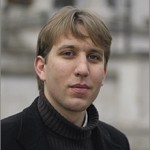 Chris Lintott is a Professor of Astrophysics in the Department of Physics at Oxford University. He is involved in a number of popular science projects aimed at bringing astronomy to a wider audience. He is probably best known as the main presenter of the BBC series, The Sky At Night.
Chris Lintott is a Professor of Astrophysics in the Department of Physics at Oxford University. He is involved in a number of popular science projects aimed at bringing astronomy to a wider audience. He is probably best known as the main presenter of the BBC series, The Sky At Night.
Zooniverse is a citizen science web portal, home to some of the internet’s largest, most popular and most successful citizen science projects. The organization started out as the Galaxy Zoo project and now hosts a wide range of projects which allow members of the public to volunteer and participate actively in scientific research. Zooniverse has it headquarters at Oxford University and the Adler Planetarium.
Since evolving out of the Galaxy Zoo, Zooniverse projects have covered astronomy, ecology, cell biology, humanities, and climate science.
Thursday 27th July – Colin Stuart – “13 Journeys Through Space and Time”

Tim Peake’s recent visit to the International Space Station has placed a fresh spotlight on the latest developments in space exploration. But space travel is still a pretty new area of human endeavour and our ideas about what and who might be out there have constantly shifted over the years. One place this is particularly apparent is in the famous Christmas Lectures held by the Royal Institution each year.
Last year Colin was lucky enough to rummage around in their archives and write a book about 13 of the lectures devoted to space and time. The first was delivered way back in 1881. The last was the 2015 lectures featuring a message from Tim from orbit. And how our ideas have changed. In this talk Colin will be sharing some of the stories from the lectures, along with some of his favourite anecdotes about digging through the archives including finding Carl Sagan’s immigration form and Dewar’s radioactive notebooks.
Strap in for more than 100 years of astronomical discovery.
This event is also part of Winchester Science Festival 2017
Website: http://www.colinstuart.net
Twitter: @skyponderer
Thursday 29th June 2017 – Emma Osborne – Exploring the Gravitational Wave Universe
On 14th September 2015, gravitational waves were detected for the first time as two black holes, millions of light  years away, crashed into one other. In this talk, Emma will take you on a whirlwind tour of gravitational waves from Einstein’s general theory of relativity to the gravitational wave observatory LIGO’s groundbreaking detection. She will be looking at the surprises this cataclysmic event unveiled. From the unanticipated discoveries made at the time of the detection, to how the black hole event horizon may cause gravitational waves to echo, and how space never forgets with gravitational wave memory.
years away, crashed into one other. In this talk, Emma will take you on a whirlwind tour of gravitational waves from Einstein’s general theory of relativity to the gravitational wave observatory LIGO’s groundbreaking detection. She will be looking at the surprises this cataclysmic event unveiled. From the unanticipated discoveries made at the time of the detection, to how the black hole event horizon may cause gravitational waves to echo, and how space never forgets with gravitational wave memory.
Emma Osborne is a theoretical astrophysicist at the University of Southampton, researching gravitational wave emission from neutron stars. She has recently launched her YouTube channel ‘The Extraordinary Universe’ where she explains concepts from Einstein’s relativity theory in short bitesize videos. Emma has a passion for science and sharing her knowledge with non-specialists audiences.
Website: www.emmalouiseosborne.com
Twitter: @emmanigma
In the meantime, have a look at Emma’s Youtube Channel
Thursday 25th May – Dr Becky Alexis-Martin “Survival Society: From Civil Defence to Preppers”
 “Parallels and distinctions are not often drawn between the experiences of emergency planning professionals and of apocalyptic survivalists, or “preppers”. Here, we explore how these two communities are ruefully linked, bound together by a commonality of preparedness and the architecture of the military industrial complex. Within popular culture, survivalists are often depicted as gun-toting bunker dwellers, taking disaster management into their own hands due to a distrust in the capacity of state to provide adequate protection. The survivalist trope has persisted, despite changes within both popular culture and prepper culture since the Cold War. So, at what point in time did the community resilience “Protect and Survive” and the rogue ferality of survivalism diverge? How did these changes in attitude reflect the influence of governance upon the individual in space and time? And who will win the battle of the bunker, in a new era of neoliberalism and individualistic catastrophism?
“Parallels and distinctions are not often drawn between the experiences of emergency planning professionals and of apocalyptic survivalists, or “preppers”. Here, we explore how these two communities are ruefully linked, bound together by a commonality of preparedness and the architecture of the military industrial complex. Within popular culture, survivalists are often depicted as gun-toting bunker dwellers, taking disaster management into their own hands due to a distrust in the capacity of state to provide adequate protection. The survivalist trope has persisted, despite changes within both popular culture and prepper culture since the Cold War. So, at what point in time did the community resilience “Protect and Survive” and the rogue ferality of survivalism diverge? How did these changes in attitude reflect the influence of governance upon the individual in space and time? And who will win the battle of the bunker, in a new era of neoliberalism and individualistic catastrophism?
Dr Becky-Alexis Martin explores real and imaginary nuclear cultures from the nuclear veterans, to the atomic Anthropocene and apocalyptic futures. She is a Senior Research Fellow in Social and Human Sciences, and the Principal Investigator of Nuclear Families. She is often found in nuclear bunkers and atomic places and spaces, and you can tweet her at @MysteriousDrBex”
Thursday, April 20 2017 Graham Smith – The Monarchy Delusion
 Thomas Paine recognised that a long habit of not thinking a thing wrong gives the impression it is right. That neatly captures the prevalent mood of the public towards the monarchy.
Thomas Paine recognised that a long habit of not thinking a thing wrong gives the impression it is right. That neatly captures the prevalent mood of the public towards the monarchy.
Those attitudes are built on myth and misdirection, assumptions that go unchallenged about how the Queen can unite the country, guard against dictatorship and make billions for the British economy. When we couple those fantasies to the conceited notion that our ‘mother of parliaments’ is the envy of the world why would anyone support change?
This grand delusion is ripe for challenge – and post-Brexit Britain is in urgent need of fundamental reform of how we’re governed. The monarchy is the source of centralized power and a primary cause of a weak parliament in the face of a powerful executive. It cannot provide the country with an effective, independent head of state and worse, it acts as an obstacle to reform. The monarchy is elitist, secretive, undemocratic and resistant to change. In that, it sets the tone for a British constitution that is no longer fit for purpose.
Graham Smith has been CEO of Republic since 2005. He originally joined the group in 1990 before moving to Australia where he was involved in community and charity work. Graham first got involved with Republic as a volunteer in 2003. Since then he has transformed the campaign group, building a strong supporter base and raising the campaign’s media profile. He has also played a leading role in establishing and nurturing the Alliance of European Republican Movements.
Thursday, February 23 2017How Violent is Islam Really? Jonathan M.S. Pearce
 This century has seen the emergence of Islam as a religion closely connected to violence and terrorism. With regrettable regularity the latest religiously inspired terror attack fills the news broadcasts around the world whether they be the work of ISIS, the Taliban, Al-Qaeda or other such group. However these events are also vociferously condemned by peaceful Islamic groups as being distinctly against the teachings of the Qu’ran. Islam is a religion of peace and unity for many Muslim across the world.
This century has seen the emergence of Islam as a religion closely connected to violence and terrorism. With regrettable regularity the latest religiously inspired terror attack fills the news broadcasts around the world whether they be the work of ISIS, the Taliban, Al-Qaeda or other such group. However these events are also vociferously condemned by peaceful Islamic groups as being distinctly against the teachings of the Qu’ran. Islam is a religion of peace and unity for many Muslim across the world.
To investigate whether violence is a part of Islam, and to what extent, Jonathan will examine in turn; the Qu’ran, the history of the prophet of Muhammad, and modern day interpretations given by Muslims. However regardless of his conclusion Jonathan will consider what role political expediency plays in accepting the narrative that fundamentalists are acting outside of the religion. It may be more desirable to accept a more moderate interpretation of Islam, even if it is less accurate.
Jonathan M.S. Pearce is a philosopher and author of several books of philosophy and theology. He is a founding member of both Tippling Philosophers and the Skeptic Ink Network.
January 26th 2017 – Dr Helen Czerski -Storm in a Teacup – The Physics of Everyday Life
 Thursday, January 26 2017 at 7:30PM Winchester Science Centre, Winchester SO21 1HZ.
Thursday, January 26 2017 at 7:30PM Winchester Science Centre, Winchester SO21 1HZ.
The old email platform is no longer fit for a purpose, so we have a new one! Apologies to anyone who received multiple emails this month. We have now dealt with it!
Our usual venue is having a new floor fitted but Winchester Science Centre are kindly welcoming us to the Planetarium this month.
What is it that helps both scorpions and cyclists to survive? What do raw eggs and gyroscopes have in common? And why does it matter? In an age of string theory, fluid dynamics and biophysics, it can seem as if the science of our world is only for specialists and academics. Not so, insists Helen Czerski – and in this sparkling new book she explores the patterns and connections that illustrate the grandest theories in the smallest everyday objects and experiences. Linking what makes popcorn pop to Antarctic winds, coffee stains to blood tests or ketchup bottles to aliens in space, every thread you pull in the fabric of everyday life shows you something new about the intricate patterns of our world. Read “Storm in a Teacup” and you will see and understand the world as you never did before. Signed copies will be available.
Helen was born in Manchester (UK), to parents who were both inquisitive about the world and encouraged Helen and her sister to find out about the world for themselves. In her teenage years, when the questions got too much, Helen’s mum frequently said ‘I don’t know. You go and get a university education and then come back and tell me’. So she did. Churchill College, Cambridge, was her home for eight years, and now she knows the answer to at least some of those questions.
Sports have played a large part in Helen’s life, and she’s always happy to learn new ones. Current favourites are badminton, running and swimming, with sailing and diving thrown in when she gets the chance.
List of past events whose details did not appear here.
| 2017 | April | Graham Smith |
| 2017 | March | Myles Power |
| 2017 | February | Jon Pearce |
| 2017 | January | Helen Czerski |
| 2016 | December | Deb Hyde |
| 2016 | November | Jo Marchant |
| 2016 | October | Barnaby Thwaites & Marcel van Limbeek |
| 2016 | September | Martin Poulter |
| 2016 | August | Kevin Precious |
| 2016 | July | Simon Guerrier and Dr Marek Kukula |
| 2016 | June | Becky Alexis-Martin |
| 2016 | May | Dean Burnett |
| 2016 | April | Andrew Bradstock |
| 2016 | March | EU Debate Tony Pryor and Alan Weatherall |
| 2016 | February | Deb Hyde |
| 2016 | January | Prof. James Crossley |
| 2015 | December | Stevyn Colgan |
| 2015 | November | Sarah kendrew |
| 2015 | October | Kevin Friery |
| 2015 | September | Jim Dunwell |
| 2015 | August | Chris Peters |
| 2015 | July | Edzard Ernst |
| 2015 | June | Elliot George |
| 2015 | May | Johnjoe Mcfadden |
| 2015 | April | Martin Graff |
| 2015 | March | Iszi Lawrence |
| 2015 | February | Alice Bell |
| 2015 | January | Simon Clare |
| 2014 | December | Mark Lewney |
| 2014 | November | Simon Singh |
| 2014 | October | Lewis Dartnell |
| 2014 | September | Aubrey de Grey |
Thursday 27th November 2014 – Simon Singh: The Simpsons and Their Mathematical Secrets
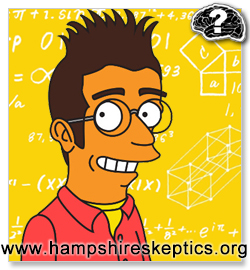
Simon Singh, author of Fermat’s Last Theorem and Big Bang, talks about his latest book, which explores mathematical themes hidden in The Simpsons.
Everyone knows that The Simpsons is the most successful show in television history, but very few people realise that its team of mathematically gifted writers have used the show to explore everything from calculus to geometry, from pi to game theory, and from infinitesimals to infinity.
Simon will also discuss how writers of Futurama have similarly made it their missions to smuggle deep mathematical ideas into the series.
After completing a PhD in particle physics, Simon Singh MBE joined the BBC and worked as a director and producer on programmes such as Tomorrow’s World and Horizon. He has also presented programmes on Radio 4, BBC4 and Channel 4.
You can keep up with Simon on his blog and on Twitter @SLSingh.
Thursday 25th September 2014 – Aubrey de Grey: Regenerative Medicine For Ageing: Can it be Comprehensive Enough?
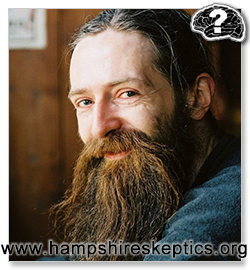
Dr. Aubrey de Grey is a biomedical gerontologist based in Cambridge, UK, and is the Chief Science Officer of SENS Foundation, a California-based charity dedicated to combating the ageing process. He is also Editor-in-Chief of Rejuvenation Research, the world’s highest impact peer reviewed journal focused on intervention in ageing. He received his BA and Ph.D. from the University of Cambridge in 1985 and 2000 respectively.
Aubrey will explain why therapies that can add 30 healthy years to the remaining lifespan of a typical 60 year old may well arrive within the next few decades and secondly, why those who benefit from those therapies will very probably continue to benefit from progressively improved therapies indefinitely and will thus avoid debilitation or death from age related causes at any age.
It may seem premature to be discussing the elimination of human ageing as a cause of death when so little progress has yet been made in postponing it. However, two facts undermine this assessment. The first is that ageing happens throughout our lives but only causes ill-health after middle age. This shows that we can postpone that ill-health without knowing how to prevent ageing completely, by molecular and cellular repair. The second is that the typical rate of subsequent, incremental refinement of big technological breakthroughs is usually fast enough (so long as public enthusiasm for them is strong) to change those technologies almost beyond recognition within a natural human lifespan.
So. Do you want to live forever ?
Thursday 28th August 2014 – Michael Marshall: Lifting The Lid – Ongoing Adventures in the World of Pseudoscience

It’s easy to think of pseudoscience existing in a glass case at a museum – something to be examined and critiqued from a safe distance, but not something to touch and to play with. Using examples taken from his own personal experiences in skepticism, Michael Marshall will show what happens when you begin to crack the surface of the pseudosciences that surround us – revealing the surprising, sometimes-shocking and often-comic adventures that lie beneath.
Michael Marshall is the Vice President of the Merseyside Skeptics Society and Project Director of the Good Thinking Society. He regularly speaks with proponents of pseudoscience for the Be Reasonable podcast. His work with the MSS has seen him organising international homeopathy protests and co-founding the popular QED conference. He has written for the Guardian, The Times and New Scientist and you can keep up with Marsh on Twitter @MrMMarsh.

Thursday 31st July 2014 – Jonny Scaramanga: Inside Britain’s Creationist Schools
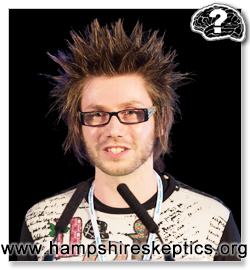
Jonny Scaramanga attended a fundamentalist Christian school in the ’90s where he learned that the Loch Ness Monster disproved evolution, God disapproved of the NHS, and homosexuals were an abomination to God. He has since discovered that almost all he learned at school was wrong.
In his talk, Jonny will give an insight to what life is like in an Accelerated Christian Education school and about what students learn in these schools today. There are sixty of these fundamentalist institutions in the UK, which teach Young Earth Creationism as fact. The Bible is taught as an infallible authority, and alternative viewpoints are not discussed or even considered. Jonny also makes some suggestions about what we should do when the parent’s right to freedom of religion conflicts with the child’s right to a sound education.
Jonny is a PhD candidate at the Institute of Education, where he is researching student experiences in Britain’s 50 Accelerated Christian Education schools. He has written for the Guardian, the Times Education Supplement, New Humanist, and Liberal Conspiracy. His broadcast appearances include BBC Radio 4, BBC2, BBC local radio, and Channel 4’s 4Thought TV.
Jonny’s blog is Leaving Fundamentalism and you can follow him on Twitter @JonnyScaramanga.

Thursday 26th June 2014 – Myles Power: Inside the Minds of the AIDS Deniers
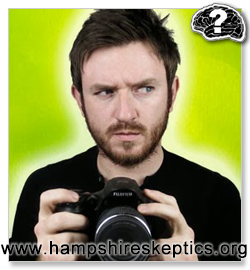
In the early days of the AIDS epidemic many bizarre and dangerous ideas were advanced regarding the origin of the disease and its cause. Since the discovery of the Human Immunodeficiency Virus (HIV) these conspiracy theories, which once filled the void left by the lack of information, have all but vanished. Over the past three decades HIV has been the subject of intense scientific research which has resulted in effective treatments, rapid HIV tests, and promising cures. Yet unbelievably there are a small number of people who are sceptical of the “official story”. Although these people are small in numbers they are extremely well funded and can pose a very real threat to public health. Many have chosen to spend their money on spreading their harmful theories, defend people who have irresponsibly infected their partners, and funded the documentary House of Numbers.
The documentary encourages people to come off their medication, tells them that HIV tests don’t work, and that anti-viral drugs such as AZT are the real cause of AIDS. To do this the makers of the documentary make liberal use of out-of-context quotations from scientists interviewed for the film, deceitful editing techniques, and flat out lies.
YouTube vlogger Myles Power has dedicated a large amount of time to exposing some of the more insidious claims in the documentary. In response there have been multiple Digital Millennium Copyright Act (DMCA) violation claims filed against Myles in an attempt to silence his criticism.
In his talk Myles will discuss some examples of the dangerous assertions in the documentary and explain how they have led to the death and suffering of hundreds of thousands of people. He will also talk about the failure of the DMCA and how it can be exploited by the proponents of pseudoscience.
You can keep up with Myles on his YouTube channel and on Twitter @Powerm1985

Thursday 29th May 2014 – Will Watling: Beat The Lie Detectors

For generations, people have tried to find ways of testing whether someone is lying. From highly dubious tests for a witch, to the invention of the polygraphs used by the CIA and the new covert phonic detection algorithms and sophisticated truth serums of today. Will explores their development, whether it’s really possible to beat them and demonstrates them with a live interrogation.
Will Watling runs Cheltenham SitP which he started in Nov 2010. When he’s not designing wealth management software, he’s running kids from A to B, or walking his two Cocker spaniels. He did a joint honours degree in RE and Science and has a keen interest in topics like evolution vs creation and the phenomenon of belief, especially cults. He also speaks at SitP on “The Omega Course – how to de-commit from Christianity” and “An Intro to 3D photography & film making”. He loves adrenaline sports and has shark dived with 8ft greys, skydived, raced Formula Renault at Thruxton and built a 1 man helium airship to take photos of landmarks from a birds eye view…
Can you tell which is the porky pie ?
Will can be found on Twitter @WillWatling and on his YouTube channel.

#52 Thursday 24th April 2014 – Suw Charman: Finding Ada Lovelace

In 2009, Suw Charman-Anderson founded Ada Lovelace Day, an international celebration of the achievements of women in science, technology, engineering and maths. With grassroots events held around the world and thousands of people writing and talking about the women who have inspired them, the day seeks to raise women’s profiles and highlight unsung heroines.
Suw will talk about why there’s a need for such a day, and also about Ada Lovelace herself. Lauded as the first ever computer programmer, Ada was a gifted mathematician, yet today she faces challenges from many voices as to the veracity of her contributions to computer science. So who was Ada? And what do we know about her work on Charles Babbage’s Analytical Engine?
Suw is a social technologist and, as one of the UK’s social media pioneers, has worked with clients worldwide. A freelance journalist, she has written about social media and technology for The Guardian, CIO Magazine and others. She currently blogs about publishing and crowdfunding for Forbes.com.
Learn more about Ada Lovelace Day, 14 October 2014, at www.findingada.com. Suw’s blog is www.chocolateandvodka.com and you can follow her on Twitter as @suw
#51 Thursday 27th March 2014 – Ben Hardwidge: The Vinyl Countdown

Join tech journalist and hi-fi enthusiast Ben Hardwidge as he tackles some of the pervasive myths about digital and analogue audio and video. Does vinyl really sound better than CD, and how do we define ‘better’? Does oxygen-free cabling really improve sound quality, and what’s the difference between a £5 cable and a £400 one? The answers are more complicated than you might imagine.
In this talk, Ben aims to go beyond the usual talk of ones and zeros, and provide a grounding in exactly how analogue and digital audio works, from the RIAA curve to the Nyquist–Shannon sampling theorem, as well as exploring the evidence for what humans can actually hear, and the need for fair testing. Forget the vague talk about open sound, warm notes and vibrant tones, this is where we focus on the hard evidence.
Ben Hardwidge is the editor of Custom PC magazine, and former reviews editor of PC Pro magazine. He’s reviewed many sound cards and audio production PCs, and has also been a hi-fi enthusiast and record collector for 20 years.
#50 Thursday 27th February 2014 – Alistair Coleman: What Do We Really Know About North Korea?

As the Kim Jong-un regime in North Korea hits the headlines again, journalist and North Korea analyst Alistair Coleman explains how the political system in Pyongyang came to be that way,and asks what hope is there for the country’s 26 million people. Is North Korea a threat to the west, and if it is, what can we do about the world’s least predictable government?
Alistair has worked at BBC Monitoring for 24 years, part of the World Service which watches and analyses the world’s open source media. Starting his career as a technician, he specialises in studying media behaviour in North Korea for significant changes in tone that could betray changes in policy.
Alistair is a multiple award-winning blogger who enjoys questioning extremism, idiocy and dubious claims; including political blow-hards, religion, stage psychics, homeopaths and quackery.
#49 Thursday 30th January 2014 – Stevyn Colgan: The Skeptical Bobby

Skepticism and critical thinking isn’t just about UFOs, bad pharma and Creationism. It’s about the everyday things too.
During his 30 years in the Metropolitan Police Service Stevyn Colgan found himself frequently challenging the traditional or ‘accepted’ ways of doing things; critical thinking and his own natural skepticism led him to explore different way of doing things, often innovative and unusual. These included using wizards to tackle street gambling, lollipops to stop anti-social behaviour and dog shows to prevent homicides. Ultimately, he was asked by Scotland Yard and the Home Office to be part of an experimental unit to explore some of these new ideas, many of which have now found their way into everyday policing across the UK.
The Skeptical Bobby is all about grass-roots skepticism and why we should be critical thinkers in every aspect of our lives.
Stevyn Colgan is an author, artist, songwriter, speaker and oddly-spelled Cornishman. He is one of the ‘Elves’ that supply the questions for the popular BBC TV series QI and co-writes its sister show, The Museum of Curiosity, for BBC Radio 4. He has, among other things, been a chef, a potato picker, a milkman and a police officer. He has written briefing notes for two Prime Ministers and TV scripts for Gerry Anderson and Doctor Who. He’s helped build dinosaur skeletons for the Natural History Museum, movie monsters for Bruce Willis to shoot at, and was the official artist for the 2006 National Children’s Book Fair. He has been set on fire twice, been shot at once, and has given hundreds of talks across the UK and USA on a variety of subjects from problem solving to Cornish mythology to why he believes that he wasn’t even vaguely intelligently designed.
Stevyn’s website is www.stevyncolgan.com and you can keep up with him on Twitter @stevyncolgan
‘Superb talk at QEDCon by Stevyn Colgan. Intelligent and humane’ – Prof Richard Dawkins

#47 Thursday 28th November 2013 – Robert Llewellyn : Electric Cars Are Rubbish. Aren’t They ?
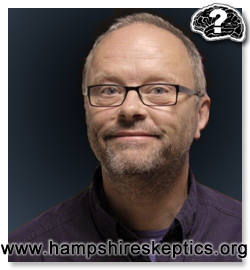
Electric cars? They’re rubbish aren’t they?! Nothing but glorified golf carts that take forever to charge and then run out of power on the way to the shops. Try finding somewhere to charge them. They cost a fortune to buy and another fortune to replace the battery when its range drops to half. You don’t want to believe all that nonsense about them being environmentally-friendly. They are actually worse than petrol-powered cars because the batteries are made from dirty lithium and use electricity made from dirtier coal. There isn’t even enough lithium in the world to make all the new batteries we’d need anyway. Electric cars are just rubbish. Aren’t they? – Robert says no. This evening he’ll tell us why he thinks we need to put away our prejudices and think seriously about electric vehicles as the future of transport.
Robert Llewellyn is an actor, writer, comedian, TV presenter and self-described wishy-washy liberal best known for playing the android Kryten in the long-running BBC sci-fi sitcom Red Dwarf. He presented Scrapheap Challenge for 10 years and these days he can be seen on TV presenting the shows Car-Pool on Dave and How Do They Do It? on Channel 5. He is probably the UK’s most prominent advocate of electric vehicles (EV) and presents a YouTube-based show called Fully Charged which documents current developments in the electric vehicle industry. He also writes a column for the EV website The Charging Point. He has been notably critical of BBC Top Gear’s position on electric vehicles – a case in point being the Top Gear review of the Tesla Roadster in 2008. Tesla Motors response to Top Gear’s review is here. This February he debated the motion “This House Believes Electric Cars are the Future of Transport” at the Oxford Union. The motion was carried.
You can catch up with Robert on Twitter : @bobbyllew

#46 Thursday 31st October 2013 – Halloween ! With Deborah Hyde : Interview With a Vampire Expert
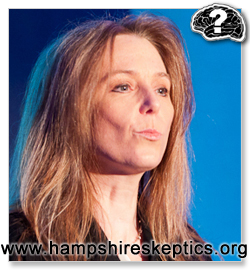
The Vampire has fascinated Western Europe from the early 1700s, but the tradition was a real part of Eastern European lives for a considerable time before that. In the last three centuries, the icon has been taken up by art of all kinds – literature, film and graphics – and it has had a lasting effect on fashion and culture.
But what is the authentic story behind tales of the predatory, living dead and can we understand a little more about being human by studying these accounts? We will look at recent attempts to understand the folklore and try to work out how an Eastern European ritual made its way to late nineteenth century New England, USA.
Deborah Hyde writes, lectures internationally and appears on broadcast media to discuss superstition, religion and belief in the supernatural. She uses a range of approaches and disciplines from history to psychology to investigate the folklore of the malign and to discover why it is so persistent throughout all human communities and eras. She is currently writing a book ‘Unnatural Predators’. She is also a film industry make-up effects production manager who gets on the wrong side of the camera from time to time.
You can keep up with Deb on Twitter @Jourdemayne and on her blog Jourdemayne.com
And as this is Halloween, the most spectral time of year when we all know that the ghosts, ghouls and goblins are out in force we thought we’d do something a little different. So if you feel like getting into the spooky spirit of Halloween then you can come along in costume. A prize will be awarded for the best costume.

#45 Thursday 26th September 2013 – Stephen Law : Believing Bullshit. How Not to Get Sucked into an Intellectual Black Hole
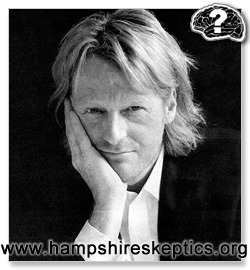
Wacky belief systems abound.
Members of the Heavens Gate suicide cult believed they were taking a ride to heaven on board a UFO. Muslim suicide bombers expect to be greeted after death by 72 virgins. And many fundamentalist Christians insist the entire universe is just 6,000 years old. Of course its not only cults and religions that promote bizarre beliefs significant numbers of people believe that aliens built the pyramids. How do such preposterous views succeed in entrenching themselves in the minds of sane, intelligent, educated people and turn them into the willing slaves of claptrap?
Believing Bullshit is a witty and insightful critique that will help immunise readers against the wiles of cultists, religious and political zealots, conspiracy theorists, and various other nut-cases by clearly setting out the tricks of the trade by which such insidious belief systems are created and sustained.
Stephen Law is Senior Lecturer in Philosophy at Heythrop College, University of London. He has written several well-known introductions to philosophy, including the prize-winning The Philosophy Gym, and edits the Royal Institute of Philosophy journal THINK: Philosophy For Everyone.
His latest book is Believing Bullshit: How Not To Get Sucked Into An Intellectual Black Hole.
You can read Stephen’s blog at Stephen Law and follow him on Twitter.

#44 Thursday 29th August 2013 – Peter Harrison : The Science of Lucid Dreaming
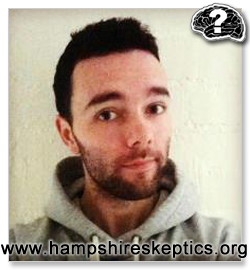
An oneironaut, or lucid dreamer, is someone who can deliberately remain consciously awake during a dream and is completely aware of the situation. With the release of Christopher Nolan’s latest film, Inception, lucid dreaming has once again been thrown into the public eye. The topic is surrounded by myths, misunderstandings, and controversy. Most communities focusing on lucid dreaming consist of individuals interested in unlocking their psychic potential, or meeting their spirit guides. For this reason, many people associate lucid dreaming with the supernatural. What many people (skeptics included) do not realise is that the existence of lucid dreaming has been well established by scientists all over the world and is actively studied in many universities and scientific establishments. This is a fascinating scientific topic, unfortunately often lumped together with irrational supernatural beliefs.
Peter Harrison is a science graduate, a magic/mentalism consultant, and a highly successful lucid dreamer. But unlike so many of his fellow oneironaughts, he’s an active skeptic and interested in the science behind the phenomenon. This talk covers the reality of lucid dreaming, the scientific evidence and experiments in this interesting field, and the abundant myths and misunderstandings.
Peter Harrison runs St Andrew’s Skeptics. Besides lucid dreaming, he also does stand-up and @reptilefacts, and loves pineapple. You can look him up at Endless Forms, Reality Is My Religion, and on Twitter.

#43 Thursday 25th July 2013 – Oliver Meech : When Magic and Science Collide
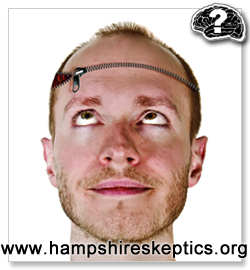
Magic boffin Oliver Meech meddles with forces we barely understand, in a comedy magic show for the QI generation. Expect brain-boggling tricks inspired by mind-blowing science. It’s the Natural Selection!
After melding magic with Neuropsychology (Ed Fringe 2011) and Time (Ed Fringe 2010) in previous hit shows, Oliver turns his attention to the rest of the universe.
Oliver Meech studied Experimental Psychology at Oxford University, Creativity at top London ad agencies and Trickery at The Magic Circle. He fuses all three to produce magic that’s ‘fascinating and different from other magicians’ (GWJWTBE blog). When not performing at Fringe festivals around the country, he hops between the UK’s Science, Cabaret and Comedy circuits.
You can catch up with Oliver on Facebook, Twitter @magicmeech, watch him on YouTube and check out his website Magicmeech.com

#42 Thursday 27th June 2013 – John Sweeney : Inside the Weird World of Scientology
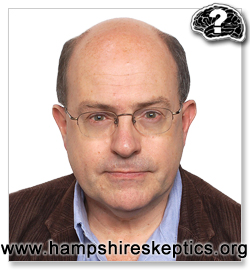
Tom Cruise and John Travolta say the Church of Scientology is a force for good. Others disagree. Award-winning journalist John Sweeney investigated the Church for more than half a decade. During that time he was intimidated, spied on and followed and the results were spectacular: Sweeney lost his temper with the Church’s spokesman on camera and his infamous ‘exploding tomato’ clip was seen by millions around the world.
John Sweeney tells the story of his experiences for the first time and paints a devastating picture of this strange organisation, from former Scientologists who tell heartbreaking stories of families torn apart and lives ruined to its current followers who say it is the solution to many of mankind’s problems.
You can follow John on Twitter @johnsweeneyroar

#41Thursday 30th May 2013 – Neil Denny : The Little Atoms Road Trip
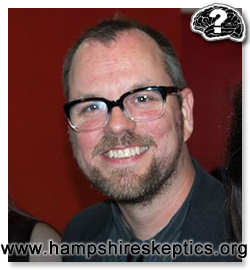
Neil Denny is the producer and presenter of the Little Atoms Radio Show and podcast. Neil was the recipient of a Travelling Fellowship from the Winston Churchill Memorial Trust, and in May 2012 he embarked upon a month long, 6614 mile road trip across America. The aim of the trip was to produce a series of podcasts which present a wide-ranging overview of science and skepticism from an American perspective. While many in Europe consider America to be the home of conspiracy theories, creationism and climate scepticism, the USA is also a scientific powerhouse.
However many of those involved in science in the US are also fighting encroaching irrationality. To be an atheist in America is still considered to be a brave and transgressive act. Creationists continue to push for the teaching of “intelligent design” alongside evolution in science classes. Campaigners are fighting to protect the right to legal and safe abortion, for the use of stem cells in medical research, and are fighting against the growing anti-vaccination movement.
Driving from San Francisco to Boston and calling in at Phoenix, Santa Fe, Chicago, Philadelphia and New York along the way, Neil recorded 39 interviews with scientists and science writers including Ann Druyan, Leonard Susskind, Kip Thorne, Priya Natarajan, Paul Davies, George Church, Neil deGrasse Tyson, Mary Roach, Edward Stone and Sara Seager. He recorded interviews at some major sites of scientific interest, including NASA’s Jet Propulsion Laboratory, The Los Alamos National Laboratory, and The American Museum of Natural History. He also spent a less scientific day visiting Kentucky’s Creation Museum. The podcasts from Neil’s trip can be found here : Little Atoms Roadtrip. Find out more about Little Atoms on their website www.littleatoms.com, and follow Neil on Twitter @littleatoms.

#39 Thursday 28th March 2013 – Alan Henness : Rise of the Laptop Lizards
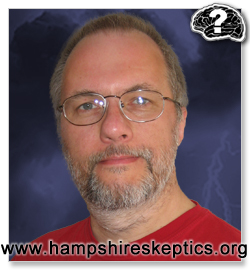
It’s been a short 12 months since the Advertising Standards Authority started to regulate marketing claims made on the Internet. In that time, the Nightingale Collaboration has given the ASA possibly their most serious challenge yet: curbing the misleading claims made on CAM websites. Many practitioners have realised their responsibilities and taken down long lists of ‘what homeopathy can help with…’, etc.
But much more needs to be done and we can’t rely on the ASA to do everything, so we’ve been using other regulators as well, particularly the medicines regulator, the MHRA.
Find out more about what we’ve been up to and what our plans are for the next 12 months.
#38 Thursday 28th February 2013 – Martin Taylor : More Lives Than One ?
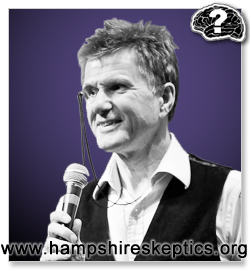
Martin S Taylor became interested in hypnosis when he was studying for a PhD at Imperial College, and soon became well known on the student circuit with his science based lecture-demonstration. At first he believed in the traditional view that hypnosis is a special induced state of mind, but discussions with friends and his experience with his own hypnotic subjects led him to subscribe to the ‘social-compliance’ view, namely that hypnosis is best explained by normal, well-understood psychological principles.
He now makes a living as a lecturer and consultant on hypnosis, talking and demonstrating at schools, universities, and anywhere else they’ll pay him. It was at one of Martin’s lectures that Derren Brown was inspired to take up his career, and Martin has worked with Derren on a number of recent television shows. Recently he has been working as a hypnosis consultant for Paramount Pictures, producing promotional videos for horror films.
In tonight’s talk, Martin will be examining the notion that hypnosis can be used to get people to remember past lives, a phenomenon taken by many as evidence of reincarnation.

#37 Thursday 31st January 2013 – Andy Lewis : What Every Parent Needs To Know About Steiner Schools

With Michael Gove and the coalition approving new Steiner Schools to open under the Free School Programme, it is timely to look closely at the origins and beliefs of Rudolf Steiner, the founder of the occult movement of Anthroposophy.
Steiner was a mystic who believed he had direct clairvoyant access to cosmic knowledge. As such he developed an esoteric belief system based on karma, reincarnation, astrology, homeopathy and gnomes. His visions gave insights into architecture, art, dance, agriculture, medicine, education, science and diet. His racial hierarchy of spiritual developmental resonated in Germany in the early 20th Century turning a personal belief into a worldwide movement. Today we find hundreds of anthroposophically inspired organisations in the UK alone: everything from Steiner Schools, Biodynamic farms to banks, pharmaceutical and cosmetic companies, charities and cheese makers.
Andy Lewis has been trying to lift the veil on the inner secrets of the movement and will discuss how this secretive movement has direct impact on public life.
You can follow Andy on Twitter @LeCanardNoir and see his website Quackometer.

#36 Thursday 13th December 2012 – Christmas Bumper Fun Pack !
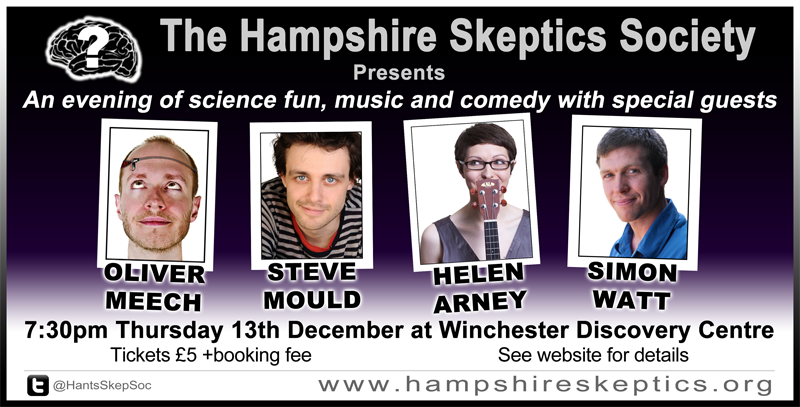

#35 Thursday 29th November 2012 – Helen Czerski : Bubbles: The Bath and Beyond
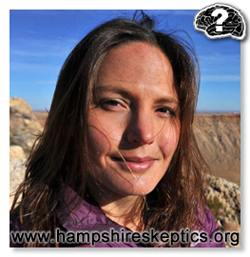
Bubbles in liquids are a fascinating and important part of our everyday world, but we still associate them mostly with having baths. After dealing with why there are bubbles in the bath in the first place, we’ll look at what bubbles do and why they’re important in our world. And then we’ll get to why a snail would blow a bubble, how penguins use them to go faster and why bubbles are a champagne connoisseur’s best friend.
My research is on bubbles formed by breaking waves in the ocean, and there’s lots to say about the most up-to-date ocean bubble discoveries and how bubbles affect weather and climate. I’ll show how we study the ocean surface in practice (often not elegant), and why it matters.
This talk will give an overview of the ways that bubbles affect our lives, both the ones we can see if we know where to look and the ones that are more remote but still important. Hopefully the audience will leave with new eyes for bubbles and some great ways to play with bubbles at home. Sadly, I can’t promise a recipe for the perfect bubble bath !

#34 Thursday 25th October 2012 – Nick Cohen : You Can’t Read This Book

Nick Cohen is a secularist, atheist and columnist for the Observer. His latest book You Can’t Read This Book: Censorship in an age of freedom looks at how religion, the wealthy and the state threaten freedom of speech.
And if you’d like a copy of Nick’s book, local independent booksellers P&G Wells will be there to help you.

#33 Thursday 27th September 2012 – Simon Frantz : Nobel Prizes: A century of genius, myths and controversies

The Nobel Prizes may have been created at the turn of the last century, but they still make headlines today. Part of the reason is that from its very beginnings it has been surrounded by secrecy, myths and controversies. I’ll explore a selection of the most interesting and debated stories over the decades – from Alfred Nobel’s will itself to the three-person selection dilemma in the world of big science projects – and show how they reveal as much about the evolving nature of scientific progress as they do about the nature of the prize.
Simon Frantz is the science and technology features editor at BBC.com, creator of the Nobel Prize Watch blog and until recently was a senior editor of Nobelprize.org and Nature Publishing Group.
The Nobel Prizes are announced in the next few weeks following Simon’s talk.

#32 Thursday 30th August 2012 – Alom Shaha : The Young Atheist’s Handbook
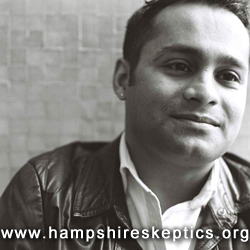
How can children brought up in religious families reconcile the different ‘truths’ they are told about the world? And to what extent should we discuss these issues in schools: what exactly should science teachers say when asked about the ‘truth’ of science by religious students?
In this talk, Alom Shaha will describe his personal experiences growing up in a Bangladeshi Muslim community in London, what role his science education played in his journey towards atheism and how, as a Physics teacher, he responds to the apparent conflict between science and religion in the classroom.
And if you’d like a copy of Alom’s book, local independent booksellers P&G Wells will be there with copies.

#31 Thursday 26th July 2012 – Prof. David Nutt : Drugs – Without the Hot Air: Minimizing the Harms of Legal and Illegal Drugs
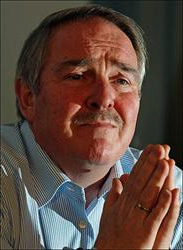
Professor David Nutt is the current Edmond J Safra chair in Neuropsychopharmacology at Imperial College London and was a member of the Committee on Safety of Medicines, and was President of the European College of Neuropsychopharmacology but it was during his chairmanship of the Advisory Council on the Misuse of Drugs (ACMD) and his refusal to fudge the issue of perceived drug harm that brought him into the public spotlight.
It is with great pleasure that we welcome Professor Nutt to Winchester Skeptics in the Pub and we hope you can join us too.
P&G Wells book sellers will be attending so you can get yourself a copy of Prof. Nutt’s new book.

#30 Thursday 28th June 2012 – Mark Henderson : The Geek Manifesto, Why Science Matters
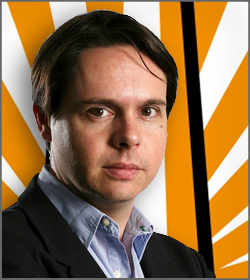
There are 650 MPs in the House of Commons. 158 have a background in business, 90 have been political advisers or organisers, and 86 are lawyers. Only one of them is a scientist. Is it any wonder that politics so often lets science down, and fails to exploit its skeptical methods to design policies that are fit for purpose?
In the Geek Manifesto, to be published by Bantam Press in May 2012, Mark Henderson explores this disconnect between science and politics, and charts the emergence of a new force that is promising to mend it. From the Simon Singh libel case to the sacking of David Nutt and the Science is Vital campaign, people who care about science are starting to stand up to be counted. The geeks are coming — and our country needs us.

#29 Thursday 24th May 2012 – Martin Robbins : Bad Science in The Developing World, trailing the homeopaths of East Africa
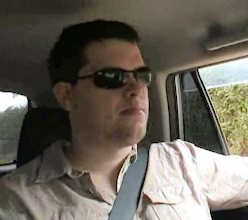
Martin Robbins of the Guardian’s Lay Science talks about dangerous pseudo-medical practices outside the Western world, from homeopaths in East Africa to flat earthers and anti-vaccine campaigns in Nigeria.
As part of the talk, Martin will be showing video clips from a trip to visit homeopathic projects in Kenya, Uganda and Tanzania last year, shot for a film he’s making with Michael Story, with support from the Wellcome Trust.
NOTE : This event is on the second to last Thursday, the 24th, and not the usual last Thursday which is the 31st. Only applies to this SitP.

#28 Thursday 26th April 2012 – David Allen Green : Thinking Skeptically About Law and Policy
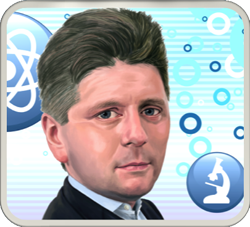
David Allen Green will explore how critical thinking and an evidence-based approach can fit in with law and policy making.
David is a lawyer and journalist. He is legal correspondent of the New Statesman and is currently long-listed for the 2012 George Orwell Prize. His journalism has included exposing Johann Hari as “David Rose” and uncovering the Times newspaper’s hack of Nightjack. David has also recently given evidence to the Leveson Inquiry. As a lawyer he is currently acting for the appellant in the “Twitter Joke Trial”. In January 2012 GQ magazine listed him as one of the most influential men in Britain.
A long-time regular of skeptics in the pub, he is founder and convenor of Westminster Skeptics.

#27 Wednesday 28th March 2012 – Deborah Hyde : The Natural History of the European Werewolf
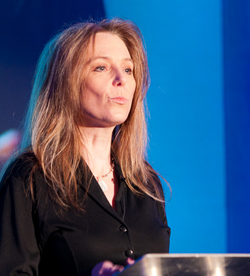
NOTE : Change of date from the usual last Thursday of the month to the last Wednesday 28th of March. Only applies to this SitP.
The werewolf is an enduring motif. Though there are many good werewolves in folkore, the prevalent type is the ravaging, insatiable beast. The werewolf so often stands for the heart of darkness of the human soul. This talk will explore how the motif was used during one of Europe’s darkest eras – the Great Witch Hunt of the sixteenth and seventeenth centuries.
Deborah is the Managing Editor of The Skeptic Magazine and also blogs as Jourdemayne

#26 Wednesday 29th February 2012 – Professor Sophie Scott : Faulty Memories
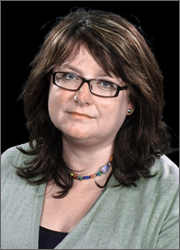
NOTE : Change of date from the usual last Thursday of the month to the last Wednesday 29th of February. Only applies to this SitP.
Sophie is a Wellcome Trust Senior Fellow and Chair in Cognitive Neuroscience at UCL. Her research is on the neural basis of human communication has a particular emphasis on how our brains decode the range of information in the voices we hear, and how that can be affected by hearing loss or stroke.
Sophie’s talk will be on the way our memories let us down and why we probably shouldn’t feel as sure of them as we do.

#25 26th January 2012 – Simon Singh, Alan Turing and the Cracking of the Enigma Code
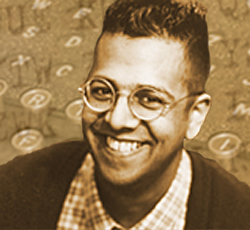
One hundred years after the birth of Alan Turing, Simon Singh discusses how Turing cracked the German Enigma code during the Second World War. He will also look at the history of cryptography prior to the twentieth century and recent developments in information security.
The talk will include a demonstration of a genuine working Enigma cipher machine !
Our Honorary President is warmly welcomed back to Winchester Skeptics to give the inaugural talk at our new venue; The Winchester Discovery Centre where we will all have a fantastic night.
See you there !
Welcome back Simon. 😀

#24 8th December 2011 – Hampshire Skeptics Society Skeptics in the Planetarium !
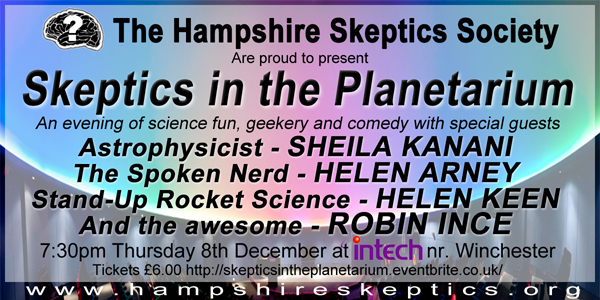

#23 24th November 2011 – Paolo Viscardi, Monsters, Myth and Misinformation
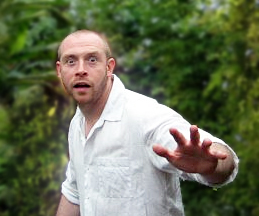
From the Montauk monster and Chupacabra to Barnum’s much hyped Feejee mermaid, there is an interest in the unusual that can whip up a storm of speculation and spectacle. Cutting through hype, sensationalism and misinformation is important in preventing the mismanagement of expectations and the devaluing of what is genuine.
Join Dave Gorman look-alike, Paolo Viscardi in exploring some weird objects from the past and present – using scientific collections and methods to get beneath the surface of monsters, mermaids and the hype they have inspired.
Paolo Viscardi is a curator of natural history at the Horniman Museum in Southeast London, a science blogger and a contributor for science Q&A site askabiologist.org.uk.

#22 27th October 2011 – Dr. Lewis Dartnell, Life ! Don’t Talk to me About Life !
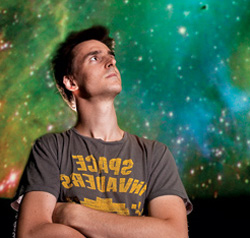
The origin of life on Earth has long been one of the great challenges in biology, if not all science. After half a century of slow progress, research over the last decade has dovetailed in a remarkable way. Work in astrobiology, earth sciences, microbiology, genetics and chemistry all point from radically different perspectives to a particular kind of deep-sea hydrothermal vent as the ideal incubator. Taken together, these exciting developments make it look as if the origin of life was surprisingly easy, and happened amazingly quickly. All that remains is to test it in the laboratory…
If life seemed to start so readily on Earth, what about the chances of life on other worlds? ‘Astrobiology’ is a brand new field of science, investigating the origins and limits of life on our own planet, and where life might exist beyond the Earth. But what actually is ‘life’ and what are the most extreme conditions terrestrial organisms can tolerate? And where in the cosmos might we reasonably expect to find ET? Come on a tour of the other planets and moons in our solar system which may harbour life, and even further afield to alien worlds we’ve discovered orbiting distant stars, to explore one of the greatest questions ever asked: are we alone…?
Lewis Dartnell is an astrobiology researcher based at University College London, looking into the possibility of life beyond Earth.
Lewis Dartnell’s website
#21 29th September 2011 – Chris Lintott, co-presenter of The Sky At Night
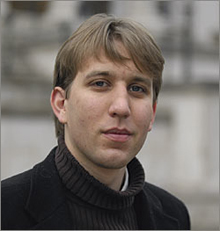
Chris is well known as the co-presenter on the nearly-fifty-year-old Sky at Night program alongside Sir Patrick Moore, and most recently as coauthor of Bang!, with Sir Patrick and Dr. Brian May.
Also Chris is the principal investigator of the Galaxy Zoo project that has inspired millions of people to take a greater interest in science and astronomy.
Describing the Galaxy Zoo project, Chris commented that, “One advantage is that you get to see parts of space that have never been seen before. These images were taken by a robotic telescope and processed automatically, so the odds are that when you log on, that first galaxy you see will be one that no human has seen before.”

#20 25th August 2011 – Alice Sheppard, When the Universe Came to the People; Citizen Science for Skeptics
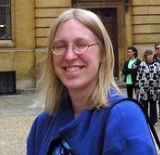
Astronomy has been the subject of wonder and speculation for as long as historical records exist. As with all science, people got some things right – and, even with the best methods available, other things wrong.
Since 2007, Alice Sheppard has run the Galaxy Zoo Forum, the discussion area for an online astronomy project with 300,000 members worldwide. Galaxy Zoo has so far produced 21 papers, whose authors and acknowledged contributors include several ordinary citizens. Some of its findings were a direct result of questions or collections of objects created by the users, who became “Citizen scientists”.
Alice takes us through some of the best and worst of astronomical history, and what ancient and modern mistakes are made today. We will hear the questions people have come to Galaxy Zoo with, the ways in which biases were found and dealt with by the scientists and participants, the beautiful and inspiring projects created by untrained people and the scientific thinking they learnt for themselves to apply.
We also take a look at citizen science in general, how Galaxy Zoo taught large numbers of people to understand and use science, and explore what this might mean for skepticism.
Alice is one of Cardiff Skeptics’s two founders (the one who does the Internet stuff while Dean faffs about being witty). By day she’s an office superviser at a charity for disabled people; by night she writes about science and astronomy.

#19 28th July 2011 – Dean Burnett, Comedy and Skepticism
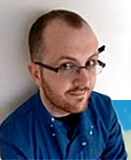
Join Dean as he discusses what he has learned and what his experience can offer after many years practicing a novel and rather extreme form of scientific engagement.
Dean Burnett is a recently qualified Doctor of Neuroscience. He is also a stand-up comedian. For the best part of a decade now, he has been using his comedic skills to promote his field of expertise to the general public, which has resulted in run ins and unfortunate incidents with the media, irate activists, Doctor Who fans, drunken hecklers and even Paramount Studios, Hollywood.
See his Blog at Science Digestive

#18 30 June 2011 – Jon Ronson, The Psychopath Test

Jon Ronson is an award-winning writer and documentary maker. He is the author of two bestsellers: Them: Adventures with Extremists and The Men Who Stare at Goats which was adapted into a Hollywood movie of the same name, and two collections, Out of the Ordinary: True Tales of Everyday Craziness and What I Do: More True Tales. He will be talking about his latest book The Psychopath Test (due for publication June 2011).
When Jon is contacted by a leading neurologist who has recently received a cryptically puzzling book in the mail he is challenged to solve the mystery behind it. As he searches for the answer, Jon soon finds himself, unexpectedly, on an utterly compelling and often unbelievable adventure into the world of madness. Jon meets a Broadmoor inmate who swears he faked a mental disorder to get a lighter sentence but is now stuck there, with nobody believing he’s sane. He meets some of the people who catalogue mental illness, and those who vehemently oppose them. He meets the influential psychologist who developed the industry standard Psychopath Test and who is convinced that many important CEOs and politicians are in fact psychopaths. Jon learns from him how to ferret out these high-flying psychopaths and, armed with his new psychopath-spotting abilities, heads into the corridors of power.
Jon Ronson’s official website is JonRonson.com

#17 26th May 2011 – Mark Stevenson, An Optimist’s Tour of the Future
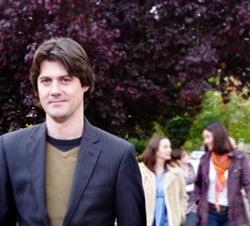
When unexpectedly confronted with his own mortality, Mark Stevenson – a writer, deep-thinker, and stand-up comedian – began to ponder what the future holds for our species.
Stevenson set out simply, asking, “What’s next?” and then traveled the globe in pursuit of the answers.
His voyage of discovery took him to Oxford to meet Transhumanists (they intend to live forever), to Boston where he confronted a robot with mood swings, to an underwater cabinet meeting in the Indian Ocean, and Australia to question the Outback’s smartest farmer. He clambered around space planes in the Mojave desert, got to grips with the potential of nanotechnology, delved deep into the possibilities of biotech, saw an energy renaissance on a printer, a revolution in communications, had his genome profiled, glimpsed the next stage of human evolution … and tried to make sense of what’s in store.
A meticulous researcher, Stevenson sifts the genuine concerns about new technologies from fear-mongering – offering up a balanced take on everything from nanotech ‘grey goo’ to worries about population and resource crises, pandemics, climate change and new forms of terrorism. “I’m not saying the future will be better,” he says “but I do know there’s everything to play for.”
An Optimist’s Tour of the Future

#16 28th April 2011 – Adam Rutherford, The Gene Code
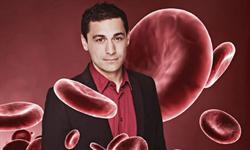
Full details to follow but we are anticipating Adam giving a talk based on his new series which will be airing in February and will cover what genetics can really tell us, and how it it is portrayed like a modern phrenology.

#15 31st March 2011 – Les Rose, Evidence-Free Health Care: Adventures in politics and other public affairs

The present coalition government may have broken the mould of British politics, but Parliament now has the poorest representation of science for very many years. So far, despite promises that things would be different, health ministers are maintaining the irrational stance taken by the previous administration. Andrew Lansley refuses to stop wasting money on homeopathy, and refuses to have alternative medicine evaluated by NICE. Dialogues with politicians and other public figures can be hugely entertaining and revealing, as this talk will show.
Les Rose is a freelance consultant clinical scientist, and has worked for over 30 years in managing clinical trials, training and advising clinical researchers, and evaluating results of trials. He coordinates a group of experts associated with Sense About Science, who are working in support of evidence-based medicine. This group was responsible for the letter which was sent to NHS trusts in May 2006, requesting them to avoid treatments which lack evidence of efficacy and safety. He regularly writes and broadcasts on this and related topics. Les is a Fellow of both the Institute of Clinical Research, and of the Society of Biology. He serves on the editorial boards of `The Biologist’, `Focus on Alternative and Complementary Medicine’ (FACT), and the`Journal of Evidence-Based Complementary & Alternative Medicine’.
#14 24th February 2011 – Mat Parker the Stand-up Mathematician

Did aliens help prehistoric Britons found the ancient Woolworth’s civilization? Matt will look at how seemingly incredible results can actually be meaningless random patterns.
Matt Parker is an enthusiastic mathematics speaker whose goal in life is to make more people excited about mathematics. He studied mathematics and physics in Australia before training to be a teacher and working in both Australia and the UK. Matt now develops and delivers highly engaging mathematics activities and his favourite number is currently 28.
Matt Parker‘s erudite brand of comedy takes on the topical and the daft in equal measure. Life’s a game for Matt and his playful enthusiasm is so infectious you can’t help but be drawn into his comedy world.
Relaxed and measured, Matt meanders through his thoughts and suggestions as the audience enthusiastically take part. A fixture of the illustrious Mathematics speaking circuit since January 2007, Matt has recently stormed into stand-up and has swiftly established himself as a exuberant new act and compère.

#13 27th January 2011 – Andrew Copson, Chief Executive of the British Humanist Association
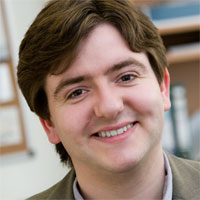 ** Please note the venue change for this event. New venue is The Slug & Lettuce, 12-13 The Square, Winchester, SO23 9ES **
** Please note the venue change for this event. New venue is The Slug & Lettuce, 12-13 The Square, Winchester, SO23 9ES **
Andrew Copson is the new Chief Executive of the British Humanist Association (BHA), the national charity promoting Humanism and representing the interests of ethically concerned, non-religious people in the UK.
His writing on humanist and secularist issues has appeared in The Guardian, The Independent, The Times and New Statesman as well as in various journals and he has represented the BHA and Humanism extensively on television news on BBC, ITV, Channel 4 and Sky, as well as on television programmes such as Newsnight, The Daily Politics and The Big Questions. He has also appeared on radio on programmes from Today, Sunday, The World at One, The Last Word and Beyond Belief on the BBC, to local and national commercial radio stations.
Andrew will be delivering a talk about the history of the Humanist movement and why we feel it so important today.
** VENUE CHANGE **
#12 14th December 2010 – The Pod Delusion Live ! and Winchester SitP Christmas Party !

The Pod Delusion is a weekly news magazine podcast about interesting things. From politics, to science to culture and philosophy, it’s commentary from a secular, rationalist, skeptical, somewhat lefty-liberal, sort of perspective. A bit like From Our Own Correspondent but with more jokes.
We’ll lay on some food and have some excellent fun with the guys from the Pod Delusion. If you’d like to contribute to the evening then please let us know.
#11 24th November 2010 – David Allen Green aka. Jack of Kent
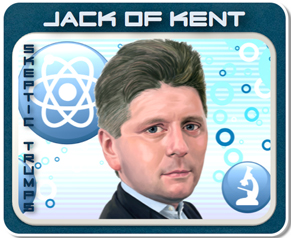
David Allen Green is a lawyer and writer living in London. He is also the convenor of Westminster Skeptics and a prolific Tweeter. Most well known for his incisive and clear blogging coverage of the recent libel action of the British Chiropractic Association (BCA) against Simon Singh.
NOTE : Change of date from the usual last Thursday of the month to the last Wednesday 24th of November. Only applies to this SitP.
#10 28th October 2010 – Frank Swain
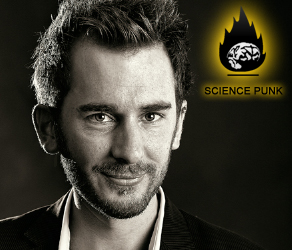
Frank Swain writes and talks about science. He holds a Bachelor’s degree in Biology and a Master’s in Natural Resource Management.
In addition to the SciencePunk website, Frank is the creator of the paper-based War On Error zine, and ex-editor of the Korovian. Previously, he worked at Sense About Science, co-editing There Goes the Science Bit…, a report by the Voice of Young Science group investigating dodgy science claims in advertising, and working with BBC’s Newsnight to reveal the pseudoscience behind the Brain Gym programme.
He has written for a number of publications including the Guardian and Times science blogs, Wired, BBC Focus, industry journal IET, art-hipster mag Plastic Rhino, and even got a few words into PR Week this one time. He’s appeared on national radio and opposite the lovely Kylie Morris on More4 News a couple of times to discuss science issues. Frank has hosted science events at the Secret Garden Party festival and the BA Festival of Science, and acted as a judge for the national Debating Matters competition.
He sits on the advisory panel for the non-profit Guerilla Science organisation and helps production companies to develop ideas for science TV.
Frank has a history of making zines, being a filthy scenester, stage-managing burlesque shows, climbing buildings, harrying his betters, arguing the toss and generally being a force for good.
#9 30th September 2010 – Professor Chris French
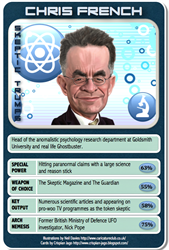 Ever since records began, in every known society, a substantial proportion of the population has reported unusual experiences many of which we would today label as ‘paranormal’. Opinion polls show that the majority of the general public accepts that paranormal phenomena do occur. Such widespread experience of and belief in the paranormal can only mean one of two things. Either the paranormal is real, in which case this should be accepted by the wider scientific community which currently rejects such claims. Or else belief in and experience of ostensibly paranormal phenomena can be fully explained in terms of psychological factors. This presentation will provide an introduction to the sub-discipline of anomalistic psychology, which may be defined as the study of extraordinary phenomena of behaviour and experience, in an attempt to provide non-paranormal explanations in terms of known psychological and physical factors. This approach will be illustrated with examples relating to a range of ostensibly paranormal phenomena.
Ever since records began, in every known society, a substantial proportion of the population has reported unusual experiences many of which we would today label as ‘paranormal’. Opinion polls show that the majority of the general public accepts that paranormal phenomena do occur. Such widespread experience of and belief in the paranormal can only mean one of two things. Either the paranormal is real, in which case this should be accepted by the wider scientific community which currently rejects such claims. Or else belief in and experience of ostensibly paranormal phenomena can be fully explained in terms of psychological factors. This presentation will provide an introduction to the sub-discipline of anomalistic psychology, which may be defined as the study of extraordinary phenomena of behaviour and experience, in an attempt to provide non-paranormal explanations in terms of known psychological and physical factors. This approach will be illustrated with examples relating to a range of ostensibly paranormal phenomena.
Professor Chris French is the Head of the Anomalistic Psychology Research Unit in the Psychology Department at Goldsmiths, University of London. He is a Fellow of the British Psychological Society and the Committee for Skeptical Inquiry. He has published over 100 articles and chapters covering a wide range of topics within psychology. His main current area of research is the psychology of paranormal beliefs and anomalous experiences. He frequently appears on radio and television casting a sceptical eye over paranormal claims. He is the editor of The Skeptic and writes a regular column for the Guardian’s online science pages. http://www.guardian.co.uk/profile/chris-french
#8 26th August 2010 – Professor David Colquhoun
Professor Colquhoun works in the Department of Pharmacology at University College London. He has been an outspoken critic of pseudoscience and scientific fraud for many years, writing extensively on the topic, including articles in Nature and The Guardian. He is particularly critical of alternative medicine, and of the decision of a number of UK universities to offer degrees in complementary and alternative medicine, stating that they are “anti-science” and that “universities that run them should be ashamed of themselves.” His interest in inference extends to methods that are used to assess and manage science, and critical assessment of research “metrics”. In December 2009, Colquhoun won a Freedom of Information judgement, after a three-year campaign, requiring the University of Central Lancashire to release details of their BSc course in homeopathy
Colquhoun created his personal website, Improbable Science, devoted to criticism of scientific fraud and quackery, in 2001. It has a particular focus on alternative medicine (AM), including such practices as homeopathy, Chinese medicine, herbal medicine, and others, calling them “pure gobbledygook”. In addition to his outspoken disapproval of AM in academia, Colquhoun frequently speaks out on his website against misrepresentation of AM as science in the media, and governmental support of AM.
#7 29th July 2010 – Andy Lewis
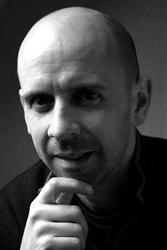 The late eighteenth century was a very creative time for inventing new forms of quackery and some people became wealthy on the back of their creations. Of these creations, it is perhaps only homeopathy that has survived virtually unchanged into the 21st century. The majority of alternative medicines available today have been invented and developed within living memory, despite claims of their origins in antiquity.
The late eighteenth century was a very creative time for inventing new forms of quackery and some people became wealthy on the back of their creations. Of these creations, it is perhaps only homeopathy that has survived virtually unchanged into the 21st century. The majority of alternative medicines available today have been invented and developed within living memory, despite claims of their origins in antiquity.
What makes an alternative medicine successful? Why should homeopathy survive when the very popular Tractors of Perkins have long since been forgotten? Could you have predicted this in 1800? Today, we have a new industry of quack devices protecting us from mobile phones. Should you invest in such enterprises?
In this talk, Andy will look at the factors that allow patent medicines to thrive, and why consumers and practitioners latch onto them. Importantly, we shall explore the implications of these views for regulation and protecting the public from delusional or fraudulent claims.
Andy Lewis developed the Quackometer website that explores the pseudoscientific claims of alternative medicine websites and their impact on society. Despite his detractors’ claims, he does not own a yacht in the South of France paid for by Big Pharma. He has yet to secure a single penny from such sources for his work.
#6 1st July 2010 – Dr. Andy Russell
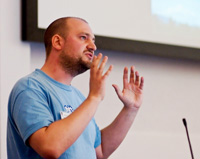 From natural cycles to global conspiracies, the climate change “sceptic” uses many arguments to challenge the scientific consensus on climate change. But how well do these arguments stand up and do these people merit the label of skeptics? In this talk we’ll examine some of the most common arguments and assess the level of “scepticism” at work.
From natural cycles to global conspiracies, the climate change “sceptic” uses many arguments to challenge the scientific consensus on climate change. But how well do these arguments stand up and do these people merit the label of skeptics? In this talk we’ll examine some of the most common arguments and assess the level of “scepticism” at work.
Andrew is a weather and climate researcher at the University of Manchester. His work focuses on European extreme events and Antarctic climate change. He runs the North-West branch of the Royal Meteorological Society and often comments on weather and climate issues in the media.
You can read his blog at http://andyrussell.wordpress.com/ and follow him on Twitter at http://twitter.com/dr_andy_russell.
#5 27th May 2010 – Simon Perry
As the year hopefully begins to warm up a bit we welcome Simon Perry, the founder of Leicester SitP to Winchester. Simon is an active campaigner against nonsense. Using the ASA, Trading Standards, other regulatory bodies and even gaining help from MPs, his campaigns have helped shut down dodgy allergy test services, prevented traditional chinese medicine salesmen from claiming to cure cancer and exposed psychic scams.
His largest involvement in a campaign, coined the “Quacklash” by Jack of Kent involved almost 600 separate letters being sent to trading standards to report claims to treat childhood diseases with a back rub. 60 of the letters gained 500 signatories. Further complaints were issued with the General Chiropractic Council.
Simon will be explaining the techniques he’s used to fight woo, what works and what doesn’t and tell stories about some of the crazy nonsense he’s encountered along the way.
Simon runs Leicester Skeptics in the Pub, blogs at http://adventuresinnonsense.blogspot.com and writes a skeptical column in the Leicester Mercury.
You can follow him on Twitter at http://twitter.com/Simon_Perry.
#4 29th April 2010 – Martin Robbins
For our April meeting the inestimable Martin Robins, researcher, science writer and author of The Lay Scientist blog will be hosting a panel group giving short talks and then taking questions from the audience.
#3 1st April 2010 – Deborah Hyde
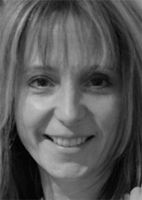 As we move into Spring we are delighted to be hosting Deborah Hyde who has been writing about the folklore of the macabre for eighteen years. Her book, ‘Unnatural Predators’ will be published this year. She blogs on belief in the supernatural as ‘Jourdemayne’, but often suffers from mission creep. Her daytime, grown-up job is a makeup effects coordinator in the film industry – more vampires and zombies, then.
As we move into Spring we are delighted to be hosting Deborah Hyde who has been writing about the folklore of the macabre for eighteen years. Her book, ‘Unnatural Predators’ will be published this year. She blogs on belief in the supernatural as ‘Jourdemayne’, but often suffers from mission creep. Her daytime, grown-up job is a makeup effects coordinator in the film industry – more vampires and zombies, then.
#2 25th February 2010 – Richard Wilson
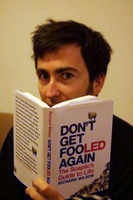
In deepest Febuary we are proud to say that Richard Wilson will be coming to speak. Richard is a blogger and the author of the highly recommended Don’t Get Fooled Again : A Sceptic’s Handbook and is one of the architects of the Trafigura toxic waste dumping scandal exposé that so recently caused such widespread legal shinanegins.
#1 28th January 2010 – Simon Singh
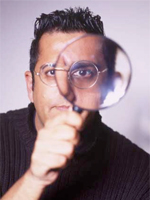
Simon will be the inaugural speaker of the Winchester Skeptics in the Pub and will be introduced by the fearless leader of the Skepchicks and co-host of The Skeptics Guide to the Universe podcast, Rebecca Watson and the awesome Sid Rodrigues, the organiser of the London Skeptics in the Pub.
Simon Singh is the author of several bestselling science books, including ‘Fermat’s Last Theorem’ & ‘Big Bang’. Most recently he co-authored ‘Trick or Treatment? Alternative Medicine on Trial’ with Professor Edzard Ernst. His Radio 4 programmes include ‘Five Numbers’, ‘Five Particles’ & ‘The Serendipity of Science’. Recently there have been a series of high profile libel cases brought against scientists, science writers and medical researchers.
Simon Singh, who is currently being sued for libel by the British Chiropractic Association, will argue that English libel laws crush free speech and block scientific progress. He will explain how our libel laws are notoriously friendly towards claimants and hostile towards defendants, which means that international libel cases are brought to London. Singh will also give his views on how libel laws could be reformed to bring them in line with other democratic countries, and will explain why he is backing a national campaign for libel reform.

